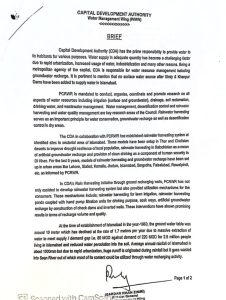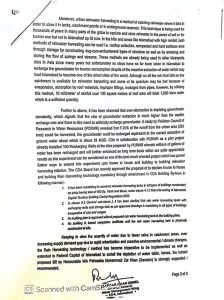ISLAMABAD: The Water Management Wing of the Capital Development Authority (CDA) has devised a plan to address the looming threat of water scarcity and potential drought in Islamabad.
Recently, the CDA Board approved a proposal to make the installation of Rain Harvesting technology mandatory for households and buildings through amendments to the CDA By-laws.
What’s the new policy?
According to clause 4.1.2 of the Islamabad Capital Territory Building Control Regulations-2020, it is now compulsory to construct rainwater harvesting tanks in all types of buildings on plots of 400 sq. yards or larger.
Furthermore, under clause 9.5 of the General sub-clause, it has been explicitly stated that all buildings, regardless of size or purpose, must have rainwater harvesting tanks with recharging wells and storage tanks in accordance with approved designs.
Building plans will not receive approval without the inclusion of the proposed rainwater harvesting tank, and no completion certificates will be issued until the tank is physically constructed on-site.


In contrast, when Islamabad was established in 1960, the groundwater level stood at approximately 10 meters. However, due to extensive water extraction to meet the supply-demand gap—80 MGD compared to a demand of 220 MGD for the 2.6 million residents of Islamabad—this level has been steadily declining at a rate of 1.7 meters per year.
This has led to reduced water infiltration into the soil. Although Islamabad experiences an annual rainfall average of around 1000mm, rapid urbanization results in significant rainwater runoff, most of which flows unused into the Soan River, a resource that could be harnessed for water recharging.
The CDA, in collaboration with the Pakistan Council of Research in Water Resources (PCRWR), has implemented rainwater harvesting systems in designated locations within Islamabad’s sectors. These models have also been deployed in arid regions like the Thar and Cholistan deserts to enhance local population resilience against drought, as well as in Balochistan to facilitate artificial groundwater recharge and provide clean drinking water for improved human security in DI Khan.
Over the past five years, rainwater harvesting and groundwater recharge models have been established in urban areas such as Lahore, Sialkot, Kamalia, Jhelum, Islamabad, Sargodha, Faisalabad, Rawalpindi, and others, according to information from PCRWR.
In summary, rainwater in Islamabad, which currently goes to waste in the Soan River, can be effectively utilized for water recharging purposes.
(Islamabad51_Newsdesk)












